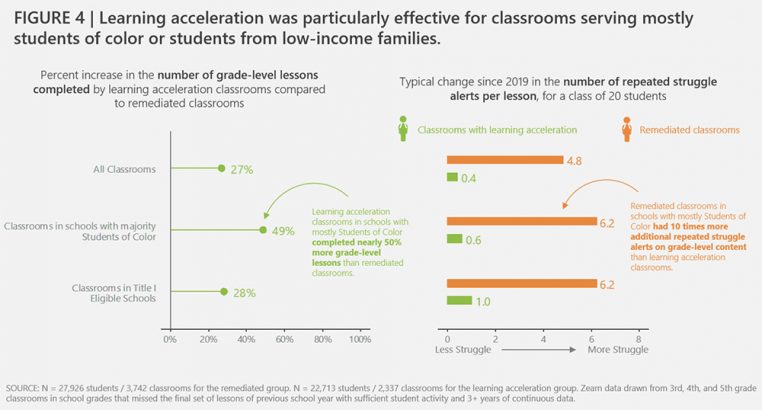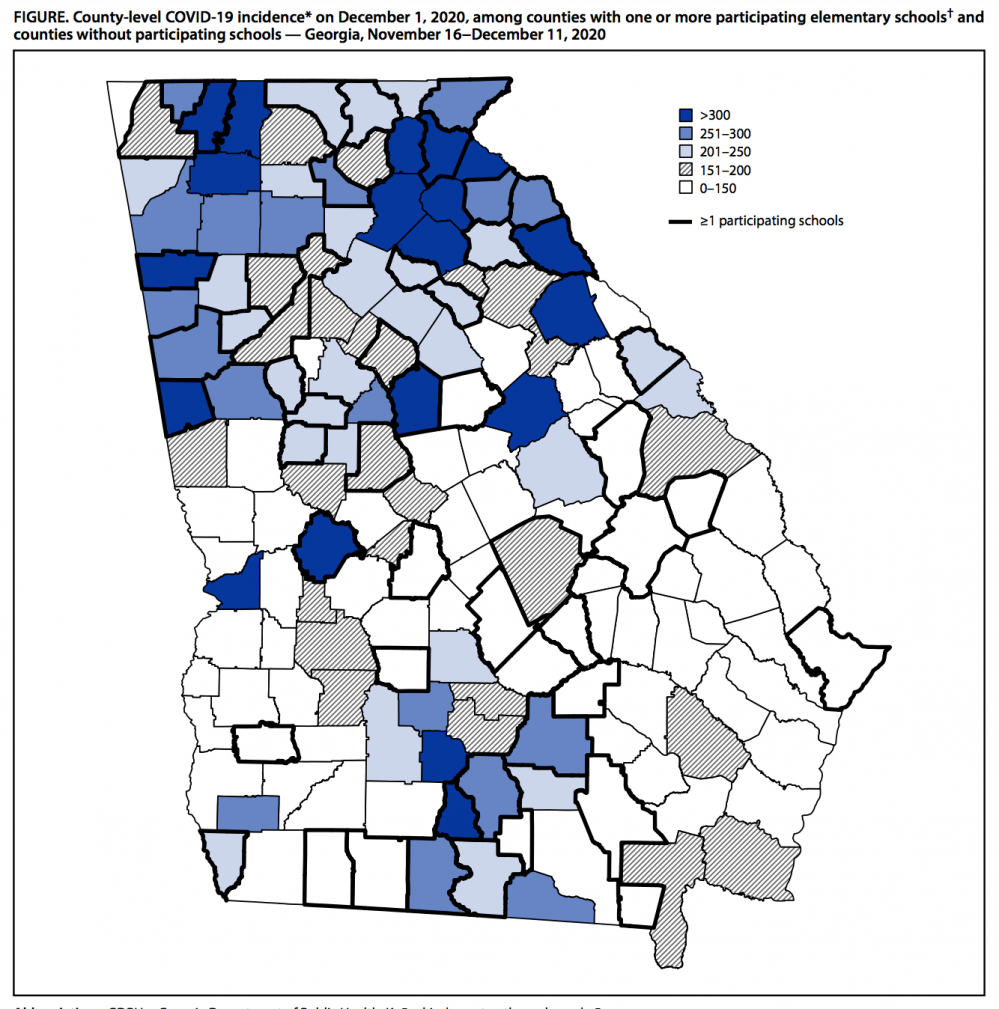The Week in COVID & Education Policy: Data Shows Students Need Acceleration Not Remediation, States Help Cities Prioritize Federal Relief Funds and 15 More School Updates

This is our weekly briefing on how the pandemic is shaping schools and education policy, vetted, as always, by AEI Visiting Fellow John Bailey. Click here to see the full archive. Get this weekly roundup, as well as rolling daily updates, delivered straight to your inbox — sign up for The 74 Newsletter.
Want to Catch Students Up? Accelerate, Don’t Remediate: New TNTP study using data from Zearn Math about making up missed learning.
- Beth Hawkins reports in The 74: Students who experienced learning acceleration struggled less and learned more than students who started at the same level but experienced remediation instead.
- Students of color and those from low-income backgrounds were more likely than their white, wealthier peers to experience remediation — even when they had already demonstrated success on grade-level content.
- Learning acceleration was particularly effective for students of color and those from low-income families.
- “If they are coached on missing skills required, students complete 27% more grade-level work than if teachers try to back up and fit in unfinished material from prior years, the researchers found.”

June 4, 2021 — The Big Three
States Are Helping School Districts Maximize Federal K-12 Relief Funds: Via Education Commission of the States. Some examples:
- Illinois: Learning Renewal Resource Guide
- Kansas: Navigating Next
- Louisiana: Achieve! Priorities-Based Planning Guide for School Systems ESSER II and ESSER III Funding
- New Hampshire: Grades K-12 Back-to-School Guidance
- Washington: Academic and Student Well-Being Recovery Plan
CDC Study on Masks and Ventilation: The new study analyzed data from 169 Georgia K-5 schools. (Read the study and the NPR coverage)
- Some schools required teachers, staff and sometimes students to wear masks; some did not.
- Between Nov. 16 and Dec. 11, infection rates were 37% lower in schools where teachers and staff members were required to wear masks, researchers found.
- But: “The 21% lower incidence in schools that required mask use among students was not statistically significant compared with schools where mask use was optional. This finding might be attributed to higher effectiveness of masks among adults, who are at higher risk for SARS-CoV-2 infection but might also result from differences in mask-wearing behavior among students in schools with optional requirements.”
- “Ventilation strategies associated with lower school incidence included dilution methods alone (35% lower incidence) or in combination with filtration methods (48% lower incidence).”
Six in 10 Parents Plan to Vaccinate All of Their Children: A new survey from the COVID Collaborative, Ad Council, and the Council of the Great City Schools shows:
- 61% of parents plan to vaccinate all of their children, 27% will not vaccinate any of their children, 12% remain mixed or undecided.
- “Parents least likely to say they will get their children vaccinated against COVID-19 include those who live in small towns and rural areas (42% will get all children vaccinated), those age 18 to 29 (46%), women 18 to 39 (51%), White mothers (51%), Black mothers (45%), women without a college education (47%), Independents (48%), and Republicans (53%); and most of these groups are among those least likely to say they have been or will get vaccinated themselves.”
- “A recommendation from their child’s pediatricians would earn trust from 83% of parents, and more than three in four say they are more likely to vaccinate their children upon hearing from top scientists and physicians that the vaccine is safe (76%) and 100% effective (77%) in children.”
Federal Updates
Education Secretary Shares His Vision: Secretary Miguel Cardona spoke with Motherly:
- “What we’re finding is with the rollout of vaccination, with the new guidance from CDC and with the data that we’re seeing that shows that schools are not places where there’s spread happening if mitigation strategies are followed, I’m really confident that we should be open now for in-person learning for all students and it can be done safely.
- “I expect that in the summer and in the fall, that our default is every day in-person option should be offered for every student.”
- “I want to assure the parents that their children’s health and safety are first and foremost in my mind and that their social and emotional well-being, their emotional health, is critically important for me, as well.”
U.S. Treasury: Will begin sending monthly payments worth up to $300 per child to millions of Americans beginning July 15. Some 39 million households, which include almost 90% of the nation’s children, are set to receive the payments.
Broadband:
- List of federal funding programs by Education Superhighway and another one by National Governors Association.
- National Telecommunications and Information Administration opened up the funding window for its $288 million Infrastructure Grant Program for broadband deployment.
- New report from Next Century Cities maps broadband access across the U.S.
City & State News
Connecticut: Schools are considering online and blended options for next year:
- “At its core, I think this is about: how do any of us learn new things?” said Manchester Public Schools superintendent Matt Geary. “It’s really about flexibility for students and families, and we don’t have all the answers but we’ve definitely done a lot of learning in the last year.”
- “Jeff Leake, the president of the Connecticut Education Association, said that the only beneficial use for remote learning is when there is no other option — for instance, during the height of pandemic, during snow days or for a student who is injured or ill and can’t get to the physical classroom.”
- “While individual school districts grapple with the realities of a changing world, some are advocating not for district-by-district solutions but for a statewide program.”
Florida: Results from January diagnostic tests taken by Miami-Dade students in grades Pre-K through 3 show that an average of 43% are below grade level in reading and 54% are below grade level in math.
Michigan: From puppets to breakout rooms: How these Michigan teachers made remote learning work. Some great interviews here.
Texas:
- Masks: Gov. Greg Abbott says no public schools or government entities will be allowed to require masks.
- Virtual learning: Schools urge quick legislative action so they can expand virtual learning after COVID-19. “More than 40 district leaders — including those from Dallas, Fort Worth and Frisco — signed a letter sent to Lt. Gov. Dan Patrick and the Senate Education Committee saying they need a framework for online school soon as they are finalizing plans for next school year.”
New York: Mount Sinai Seeks to Expand School Virus Testing Program. “The health system, which is preparing to open a new laboratory that could process 100,000 tests a day, wants to take its program to public schools this fall.” (Read the press release and The New York Times story)
States Differ on Whether Parents Need to Sign Off On Teens’ Vaccinations: CNN has a list of states that require parent consent.
COVID-19 Research
Mitigation Practices and COVID-19 Rates in Schools: Report on Data from Florida, New York and Massachusetts: New study from Emily Oster et al.
- “We find higher student COVID-19 rates in schools and districts with lower in-person density but no correlations in staff rates.”
- “If students and teachers who are out of school engage in higher risk activities, more time in school could in principle be protective.”
- “All rates are lower in the spring, after teacher vaccination is underway.”
- “In discussing these results, it is crucial to keep in mind that these data represent correlations and we cannot make strong causal claims. Notably, we expect school mitigation practices to reflect community mitigation practices: areas in which schools take more precautions will also take more precautions in other areas of society, making it difficult to attribute effects directly to the school behavior.”
Moderna: Released data showing its COVID-19 vaccine was found to be 100% effective in children 12 to 17 two weeks after second dose; the company plans to request emergency use authorization approval for adolescents in early June. Moderna and Pfizer have both applied for full FDA approval for their COVID-19 vaccines.
Children Infected With COVID-19 Tied to More Complications Than the Flu: A new study finds that, compared to the flu, kids with a COVID-19 infection face a higher risk for hospitalization, pneumonia and other complications.
- “In one of the U.S. databases, the hospitalization rate for COVID-19 patients was 33.2% compared to 7.4% among those with the flu.”
Long-run Macroeconomic Effects of COVID-19 School Closures: “Students currently in grades K-5 from disadvantaged backgrounds will have on average 10.9% lower labor income in 2050 than was expected before the closures, while those in grades 6-12 from disadvantaged backgrounds will have 8.2% less labor income.” (Via University of Pennsylvania)
COVID Testing Enables In-Person Instruction and Extracurricular Activities in High School: A CDC study found Utah’s Test-to-Play program allowed high schools to hold 95% of their scheduled winter sports competitions.
Viewpoints
Schooling Has Changed Forever. Here’s What Will Stay When Things Go Back to ‘Normal’: Great article by Peggy Barmore:
- “A public school district in Arizona is looking to become a service provider for parents who have pulled their children out to home-school them. In Oklahoma, students are having a say in where and when they learn. And educators everywhere are paying closer attention to students’ mental well-being.”
- “Anne Gullickson, CEO and founder of the nonprofit A for Arizona, has given grants of $20,000 or more to schools and districts to launch a number of new programs. The proposals included after-hours study groups for third graders to work with a qualified teacher or tutor to stem learning loss during the pandemic; an outdoor learning hub to reengage students who weren’t attending online classes; and an in-person small learning community with social and emotional supports for students suffering from trauma.” (Learn more about the A for Arizona grants from The 74)
- “More educators are realizing ‘you’re not going to achieve the academic gains that you want to see without attending to the social and emotional development of young people,’ said Karen VanAusdal, senior director of practice for CASEL.”
High Dosage Tutoring: A new primer from Transcend offers definitions, resources and advice.
COVID-19 Toolkit for Districts and Schools: From EdTrust and Education Resource Strategies
Poll of Black Parents: From EdChoice/Morning Consult, fielded April 16 to May 7. Read the brief and the crosstabs (which show a ton of other data on assessment, purpose of schooling, SEL and more)
- Vaccines: Black parents are less likely than both white and Hispanic parents to either vaccinate themselves or their children.
- Pods: More than two-fifths of Black parents say they are currently participating in or looking to form/join a learning pod – an increase of five points since March. Hispanic parents remain more interested in both pods and tutoring than both Black and White parents
Impact of COVID-19 on Teaching and Learning: New survey from Digital Promise shows teachers perceived their students’ top problem as missing social interactions at school or with friends (88%), followed by keeping up academically (82%).
Closing the Homework Gap While Protecting Student Privacy: A new Center for Democracy and Technology resource provides guidance on five areas that can pose risks to both equity and student privacy.
…And on a Reflective Note
Kaya Henderson challenges and inspires us during her remarks at the NewSchools Venture Fund Summit this week as she reflects from a place of hurt and a place of love.
- James Baldwin: “A child cannot be taught by anyone who despises him, and a child cannot afford to be fooled.”
- Henderson: “We can no longer create systems where children are not learning about themselves, where they are learning by people who make decisions for them and who decide success that don’t love them.”
- Frederick Douglass: “It is easier to build strong children than to repair broken men.”
ICYMI @The74
Weekend Reads: In case you missed them, our top five stories of the week:
- STEM: The Truth is Out There. But With New UFO Report Expected to Land Soon, Talk of Alien Life is Also Becoming More Common in the Nation’s Science Classrooms (Read more)
- Mental Health: EmpowerU, Minnesota-Based Social-Emotional Learning Platform, Provides One-on-One Online Counseling to Thousands of K-12 Students (Read more)
- Equity: First Hearing This Week in Lawsuit Charging California Denied Equal Education to Low-Income Students of Color During Pandemic (Read more)
- Reopening: Analysis: Many Kindergartners Aren’t Showing Up as Schools Reopen in Person. How Some Large Urban Districts Are Trying to Re-engage Families (Read more)
- Curriculum: Tulsa Commits to Teaching ‘Hard History’ After State Restricts Antiracist Instruction (Read more)
Disclosure: John Bailey is an adviser to the Walton Family Foundation, which provides financial support to The 74.
Get stories like these delivered straight to your inbox. Sign up for The 74 Newsletter

;)

